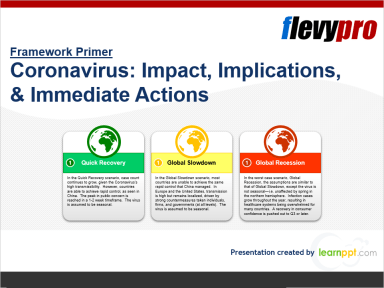
Originally published: 18/03/2020 15:27
Publication number: ELQ-93552-1
View all versions & Certificate
Publication number: ELQ-93552-1
View all versions & Certificate

Coronavirus: Impact, Implications, & Immediate Actions
This deck discusses the business impact and implications of the Coronavirus pandemic; and critical actions to take.
Best Practice Frameworks & Tools (used by Fortune 100) - Strategy, OpEx, Digital, Change, ProcessFollow
coronaviruscovid-19pandemicscenario analysisbusiness continuitysupply chaincrisis managementrecession
Description
The entire world is currently dealing with the same crisis, the Coronavirus Disease 2019 (COVID-19) pandemic. Countries, organizations, and individuals are faced with extremely serious risks, uncertainties, challenges, questions, and decisions—in many cases existential in nature. It is important for everyone to arm themselves with accurate, comprehensive information to best prepare themselves and their organizations to manage through this crisis by making informed, thoughtful decisions.
This presentation contains 2 sections.
The first is a Scenario Analysis of best, average, and worst case scenarios driven by the COVID-19 global outbreak. These 3 scenarios are:
1. Quick Recovery - Under this scenario, case count continues to grow, given the Coronavirus’s high transmissibility. However, countries are able to achieve rapid control, as seen in China. The peak in public concern is reached in a 1-2 week timeframe. The virus is assumed to be seasonal.
2. Global Slowdown - Under this scenario, most countries are unable to achieve the same rapid control that China managed. In Europe and the United States, transmission is high but remains localized, driven by strong countermeasures taken individuals, firms, and governments (at all levels). The virus is assumed to be seasonal.
3. Global Recession - In the worst case scenario, Global Recession, the assumptions are similar to that of Global Slowdown, except the virus is not seasonal—i.e. unaffected by spring in the northern hemisphere. Infection cases grow throughout the year, resulting in healthcare systems being overwhelmed for many countries.
The second section delineates 6 immediate and critical actions organizations should be taking:
1. Protect Employees
2. Set up a Cross-functional Response Team
3. Ensure Sufficient Financial Liquidity
4. Stabilize the Supply Chain
5. Practice Customer-centric Design (CCD)
6. Help the Community
We hope you can leverage these slides to help guide and manage your organization safely and successfully through this crisis.
The entire world is currently dealing with the same crisis, the Coronavirus Disease 2019 (COVID-19) pandemic. Countries, organizations, and individuals are faced with extremely serious risks, uncertainties, challenges, questions, and decisions—in many cases existential in nature. It is important for everyone to arm themselves with accurate, comprehensive information to best prepare themselves and their organizations to manage through this crisis by making informed, thoughtful decisions.
This presentation contains 2 sections.
The first is a Scenario Analysis of best, average, and worst case scenarios driven by the COVID-19 global outbreak. These 3 scenarios are:
1. Quick Recovery - Under this scenario, case count continues to grow, given the Coronavirus’s high transmissibility. However, countries are able to achieve rapid control, as seen in China. The peak in public concern is reached in a 1-2 week timeframe. The virus is assumed to be seasonal.
2. Global Slowdown - Under this scenario, most countries are unable to achieve the same rapid control that China managed. In Europe and the United States, transmission is high but remains localized, driven by strong countermeasures taken individuals, firms, and governments (at all levels). The virus is assumed to be seasonal.
3. Global Recession - In the worst case scenario, Global Recession, the assumptions are similar to that of Global Slowdown, except the virus is not seasonal—i.e. unaffected by spring in the northern hemisphere. Infection cases grow throughout the year, resulting in healthcare systems being overwhelmed for many countries.
The second section delineates 6 immediate and critical actions organizations should be taking:
1. Protect Employees
2. Set up a Cross-functional Response Team
3. Ensure Sufficient Financial Liquidity
4. Stabilize the Supply Chain
5. Practice Customer-centric Design (CCD)
6. Help the Community
We hope you can leverage these slides to help guide and manage your organization safely and successfully through this crisis.
This Best Practice includes
PDF Presentation







